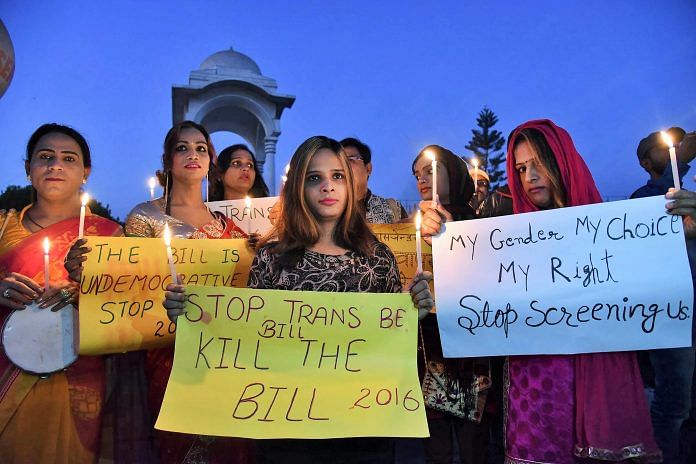My strength is my womanhood. Like a rainbow, I have multiple identities – a member of the LGBTQ community, an activist challenging the status quo, a woman fighting a government whose supporters openly hold rallies backing a person accused of raping a child, a citizen who demands equal status for women.
But the world had once told me that I can “never be”.
Much of that changed in 2018, a year that was monumental for me in two ways: Supreme Court delivered its landmark judgment on Section 377 and my process of being inducted into the Congress began.
A sense of freedom
About 16 years ago, I found my true self and truly came into my own. That day, I felt like a fighter ready to face the world of male chauvinism and discrimination, one that would always second-guess my intentions and reduce my identity to just my gender or sexuality.
And then last year, I experienced a sense of freedom when the Supreme Court on 6 September partially struck down Section 377 of the IPC, and decriminalised homosexuality.
Many saw it as a big push to the LGBTQ community, while others saw this as a move towards inclusion. I view it as more than just that. It means true independence for a prisoned soul whose choices were earlier dictated by draconian social attitudes.
Need for a political platform
Since the court’s ruling, there has been little effort from the government to bring the LGBTQ community into the mainstream. Sensitisation of authorities over LGBTQ rights is still a pipe-dream.
I have worked in the media for years, and have seen the power of the pen help push boundaries. My work took me to Americas and Europe, but mainstream support was still lacking. I needed the power of a political platform to be a catalyst for redefining societal norms and practices.
And, that protective pat on the back came from Sushmita Dev, a Lok Sabha MP and president of the All India Mahila Congress. In 2018, as I struggled to find a political identity, she offered me a role after discussing it with Rahul Gandhi, the Congress president.
Many Indian political leaders want to passionately make up for the wrongs they have committed against the minorities, but fail to recognise the third gender as a part of that community. I had very refreshing and frank conversations with Sushmita Dev, who wants gender justice in every sphere of life.
Also read: The Trans Bill sets the rights of the community back by 50 years
Rahul Gandhi’s welcoming body language
A few months later, in January 2019, I joined the Congress party in the presence of Rahul Gandhi, and became the national general secretary of the All India Mahila Congress. With that, I also became the party’s first transwoman office-bearer.
Most individuals while meeting a transwoman show either uneasiness or sympathy, and neither of that is encouraging. Rahul Gandhi was generous with his time, showed a welcoming body language and was more interested in how “we can all work together” and create equal opportunities for all communities.
Rahul Gandhi supported LGBTQ rights as far back as 2013 when the Supreme Court had upheld Section 377 of the IPC. He had thrown his weight behind the LGBTQ community and its demand for a right to live with dignity.
Also read: Remembering Jayalalithaa: Those she put in power are parading her coffin for votes
The fight continues
India loses a significant chunk of the GDP by denying women equal participation in the economy.
Encouraging women to join the mainstream would not just indicate social empowerment, but also enable them to be economic actors who make financial decisions for themselves and their families.
Every day, hundreds of transwomen get thrown out by their families. They live on the streets and face the threat of sexual violence and torture. Most of my sisters don’t have an education and are left to beg for food. Medical transition costs anywhere between Rs 2-3 lakh and unless done well, we continue to be the butt of all jokes and bullying.
So, when the government introduces the Transgender Persons Bill without any concern for our status as deprived individuals and only looks at the need for rehabilitation, it is unfair.
We cannot talk about rehabilitation without talking about equal opportunity. Reservations must be given in education and housing. Medical subsidies must be extended to help with transition and, above all, there should be no interference in personal living arrangements.
The bill lashes out at transwomen who live together as “families”. When parents ostracise their trans children, other community members take them in and protect them. How can a government legislate against personal living arrangements?
For a transwoman, the transition to another gender is a long and rocky journey, from hormone therapy to feminisation to gender-reassignment surgery. During this time, we must be identified as the gender we are transitioning to. The Bill puts the onus on a medical officer to tell trans individuals if they’re ‘good enough’ to be who they truly are! This can seriously dent a person’s sense of the self.
I hope to inspire a generation of women to push for equal status. Rights, responsibilities and opportunities should not depend on whether one is born male or female. I want to work towards a day when everyone is free to make decisions without the limitations set by strict gender roles. Aspirations and needs of women must be as important and favoured as anyone else’s.
Also read: How 3 bills violate the rights of the very people they seek to empower
(Apsara Reddy is National General Secretary, All India Mahila Congress and in-charge of communication)




What is happening in India.